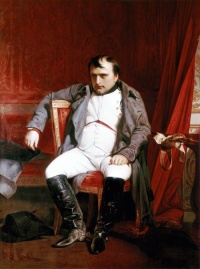Napoleon Bonaparte and Joséphine de Beauharnais
From The Art and Popular Culture Encyclopedia
| Revision as of 10:08, 1 June 2013 Jahsonic (Talk | contribs) ← Previous diff |
Current revision Jahsonic (Talk | contribs) |
||
| Line 1: | Line 1: | ||
| + | [[Image:Napoléon Bonaparte abdicated in Fontainebleau.jpg|thumb|right|200px|''[[Napoléon Bonaparte abdicated in Fontainebleau]]'' (1845) by [[Paul Delaroche]]]] | ||
| {{Template}} | {{Template}} | ||
| - | [[Josephine de Beauharnais]], now a widow, had affairs with several leading political figures, including [[Paul François Jean Nicolas Barras]]. In 1795, she met [[Napoléon I of France|Napoléon Bonaparte]], six years her junior, and became his mistress. In a letter to her in December, he wrote, "I awake full of you. Your image and the memory of last night’s intoxicating pleasures has left no rest to my senses." | + | [[Josephine de Beauharnais]], a widow after the death of [[Alexandre de Beauharnais]], had affairs with several leading political figures, including [[Paul François Jean Nicolas Barras]]. In 1795, she met [[Napoléon I of France|Napoléon Bonaparte]], six years her junior, and became his mistress. In a letter to her in December, he wrote, "I awake full of you. Your image and the memory of last night’s intoxicating pleasures has left no rest to my senses." |
| In January 1796, Napoléon Bonaparte proposed to her and they married on 9 March. Until meeting Bonaparte, she was known as ''Rose'', but Bonaparte preferred to call her ''Joséphine'', the name she adopted from then on. | In January 1796, Napoléon Bonaparte proposed to her and they married on 9 March. Until meeting Bonaparte, she was known as ''Rose'', but Bonaparte preferred to call her ''Joséphine'', the name she adopted from then on. | ||
Current revision
|
Related e |
|
Featured: |
Josephine de Beauharnais, a widow after the death of Alexandre de Beauharnais, had affairs with several leading political figures, including Paul François Jean Nicolas Barras. In 1795, she met Napoléon Bonaparte, six years her junior, and became his mistress. In a letter to her in December, he wrote, "I awake full of you. Your image and the memory of last night’s intoxicating pleasures has left no rest to my senses." In January 1796, Napoléon Bonaparte proposed to her and they married on 9 March. Until meeting Bonaparte, she was known as Rose, but Bonaparte preferred to call her Joséphine, the name she adopted from then on.
The marriage was not well received by Napoléon's family, who were shocked that he had married an older widow with two children. His mother and sisters were especially resentful of Joséphine as they felt clumsy and unsophisticated in her presence.
Two days after the wedding, Bonaparte left to lead the French army in Italy. During their separation, he sent her many love letters. In February 1797, he wrote: “You to whom nature has given spirit, sweetness, and beauty, you who alone can move and rule my heart, you who know all too well the absolute empire you exercise over it!” Many of his letters are still intact today, while very few of hers have been found; it is not known whether most were lost or that few existed to begin with.
Joséphine, left behind in Paris, began an affair in 1796 with a handsome Hussar lieutenant, Hippolyte Charles. Rumors of the affair reached Napoléon; he was infuriated, and his love for her changed entirely.
In 1798, Napoléon led a French army to Egypt. During this campaign, Napoléon started an affair of his own with Pauline Fourès, the wife of a junior officer, who became known as "Napoléon's Cleopatra." The relationship between Joséphine and Napoléon was never the same after this. His letters became less loving. No subsequent lovers of Joséphine are recorded, but Napoléon had sexual affairs with several other women. In 1804, he said, "Power is my mistress."
In December 1800, Joséphine was nearly killed in the Plot of the Rue Saint-Nicaise, an attempt on Napoléon's life with a bomb planted in a parked cart. On 24 December, she and Napoleon went to see a performance of Joseph Haydn's Creation at the Opéra, accompanied by several friends and family. The party travelled in two carriages. Joséphine was in the second, with her daughter Hortense, her pregnant sister-in-law, Caroline Murat, and General Jean Rapp. Joséphine had delayed the party while getting a new silk shawl draped correctly, and Napoléon went ahead in the first carriage. The bomb exploded as her carriage was passing. The bomb killed several bystanders and one of the carriage horses, and blew out the carriage's windows; Hortense was struck in the hand by flying glass. There were no other injuries and the party proceeded to the Opéra.


